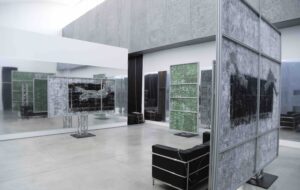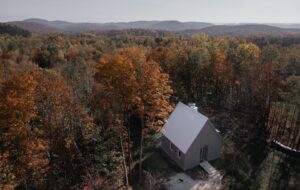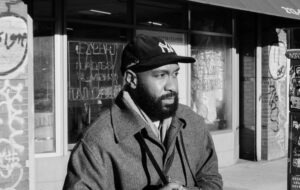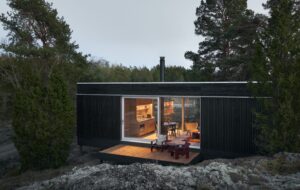

Words William Wiles
As I was cycling south through the City of London, a seductive female voice said in my ear: “Find a stinking arsehole of a place, and tell me about it.” Naturally, I obliged, turned off the main road, and discovered a suitably urine-stained doorway next to an office service entrance, where rancid bins were waiting to be collected. I told her all about it.
This excursion was part of Rider Spoke, a project by arts group Blast Theory. It builds on their previous ventures Can You See Me Now? and Uncle Roy All Around You (icon 014), which established the company on the cutting edge of a new kind of interactive arts event – part performance, part experiment and large part game. Arriving at the Barbican in groups of five at 15-minute intervals, participants are equipped with a bicycle, a helmet and a high-tech Nokia console to fix to the handlebars. They are then told to get lost.
The purpose of the game is to cycle aimlessly until prompted by the console screen or earpiece. You can go in any direction you like, as far as you like, so long as you are able to make it back to the Barbican before your time is up. The console tracks your progress via wi-fi fingerprinting, discerning your location from the identity of the wireless networks in the air around you; prompts are triggered by elapsed distance travelled, time taken or present location.
Unlike previous Blast Theory projects, Rider Spoke is completely open-ended – Can You See Me Now? was an elaborate game of hide and seek and Uncle Roy was a treasure hunt. In Rider Spoke, one travels until the disembodied voice interrupts with a bit of musing on the nature of the city, followed by a question or instruction. For instance, you might have to find a particularly noisome piece of real estate, as described above, or a window one would like to live behind, or to say what it felt like to leave somewhere and never return. But to record your answer, first you must find a hiding place. These are actually Blast Theory’s wi-fi hotspots, and when you come within range of one, “You can hide here” flashes up on your screen. Once you’ve recorded your thoughts, you’re given a choice – explore again, waiting for another question and another hiding place, or listen to the answers left by others.
Selecting the second option brings up a choice of three players’ names, and the locations of their answers stowed in virtual hiding places. I listened to Richard telling me about his father and a long walk they had taken together the last time they met, and later a rambling monologue by Sheila about how she was an incredibly nervous cyclist, the other road users were intimidating her, and how she had once drunk far too much cider at a party, announced to the assembled company that she had not been sick, and then vomited copiously. Even with their names and the intimate details of their lives, these other players are strangers. Every now and then I thought I saw another player – but they may have just been other cyclists. Maybe Sheila and Richard had played the previous week and were elsewhere, only their memories lingering in the alleys of the city.
Despite its technological sophistication, then, the premise of Rider Spoke was very simple, the leaving and finding of messages in secret locations, virtual dead-letter drops. The collected experiences of other players were an invisible tapestry laid over the map of the city, just as we build up our own mental topographies of memories associated with places. It was fleetingly like sharing the inner landscape of others, the thoughts and feelings that rise up as we wander through the streets.
For all the wi-fi bells and whistles, the experience plucked at primal instincts: finding hidden stashes and traces of fellow souls across distance, and sharing stories. But this was cut short by the modern preoccupation of the ticking clock. Only an hour was allotted to each rider, and that hour was painfully short. As soon as it was over, I wanted more. We are truly fortunate in this century, in the wired and anonymous city, to have rediscovered aboriginal notions of songlines and dreamtime, to explore with the aid of mobile technology a new form of strangely low-tech play. Rider Spoke was magical, and I look forward to the next Blast Theory project.
Rider Spoke was at the Barbican, London, 11–21 October



















